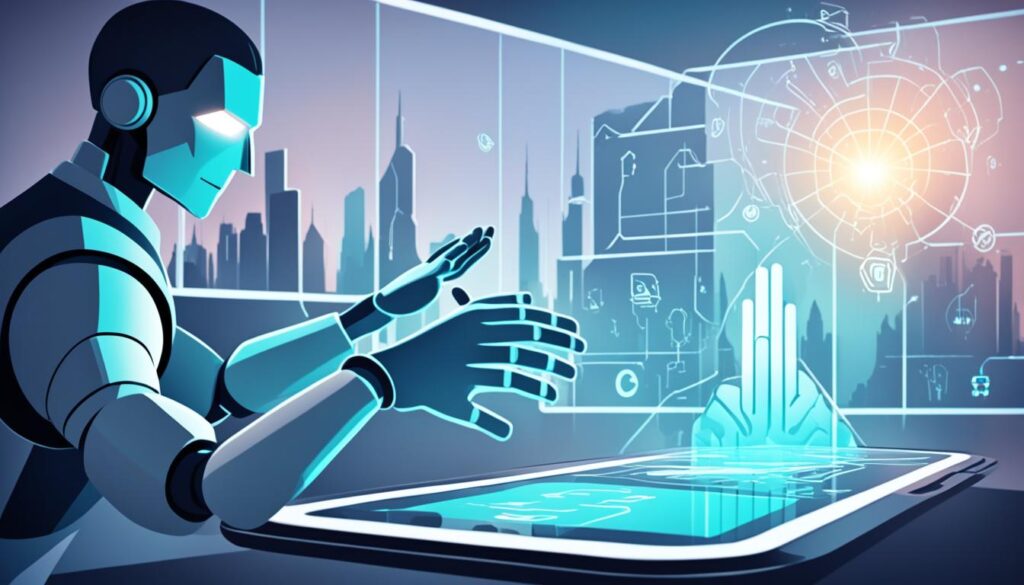In today’s world, we often look for love and friendship on social media and dating apps. But can AI companions really fill the gap left by human connection? As AI becomes more common in our lives, it’s changing how we communicate, from healthcare to marketing, and even mimicking loved ones who have passed away. This raises big questions about our relationships.
Many social media users check up on past partners, and most Americans think it’s wrong to go through someone’s phone. This shows how our online and real-life connections are not the same. Can AI companions help close this gap, or will they make our relationships shallower?
AI systems are getting better at keeping relationships going over time. They can build on shared experiences and feelings, offering real companionship, emotional support, and mental stimulation. But, the idea of superintelligent AI being smarter than us makes us wonder about the future of our connections.
Are you ready to look into how AI companions and the future of human connection interact? Get ready to question what you think and enter the world of artificial intelligence and its effects on our closest relationships.
The Rise of AI Companions
Replika and the Evolution of Conversational AI
Artificial intelligence is getting better, and AI companions are becoming more popular. Replika is a chatbot platform started by Eugenia Kuyda. It focuses on building close relationships, not just making people more productive. Replika has moved from simple scripts to more advanced AI, showing how conversational AI is improving.
About 40% of Gen Z singles are okay with having an AI partner in the future. Also, 31% of Americans feel the same way. But, not everyone is on board. 59.14% of women and 52.59% of men in relationships don’t like the idea of AI partners.
Replika has become very popular, with millions of users. People use it for different things, like making friends, finding romantic partners, or getting advice during tough times. This shows how versatile these virtual assistants can be.
Eugenia Kuyda made Replika after a close friend died suddenly. She wanted to help people feel connected. As AI like Replika keeps getting better, we’ll keep talking about how they change our social lives.
The Promise of AI Companions
AI technology is getting better, showing how AI companions can make human connections stronger. These digital friends are learning to remember past talks and even have their own personalities. Experts say these AI friends can’t truly replace real human talks, though.
Lonely people or those feeling left out find AI friends easy to talk to. They offer constant care and company. This is great for the elderly in homes or those stuck in their rooms due to illness. People also use AI chatbots to practice being romantic in real life, finding it helpful.

But, the growth of AI friends also brings worries. Some worry it could lead to fewer babies, making the workforce smaller and affecting the economy. Yet, AI companions still offer hope in tough times, helping us feel less alone.
The emotional intelligence and social implications of AI friends are changing. It’s clear that these technological advancements bring both promise and challenge for how we connect with each other in the future.
Friend or Foe? AI Companions and the Future of Human Connection
The rise of AI companions has sparked a debate: will they help or hurt our human connections? The answer depends on how we see the psychological effects and the changing ways humans and AI interact.
Studies, like Finn’s in Nature Machine Intelligence, show our view of AI greatly affects how we interact with it. If we see AI as caring, we trust it more and think it’s more empathetic and helpful. This shows how our imagination shapes our AI experiences.
AI companions can offer emotional support and always be there for those who want company. But, they don’t offer the deep connections we have with other humans. As humans and machines interact more, we must think about how this affects our interpersonal relationships and psychological well-being.
The role of AI companions in our future connections is complex. They bring convenience and help in many areas, like healthcare and fighting climate change. Yet, we need to think carefully about how humans and machines interact. We should see AI companions as tools that can help, but also value the unique nature of human connections.
Ethical Considerations
As AI companions grow, we must think about their ethical sides. A big worry is how AI might spread and boost human biases. The data used to train them can show biases from society, making these biases worse.
This makes us wonder if AI companions are fair and include everyone. They might not treat all users the same way.
Also, making AI understand common sense and moral reasoning is hard. It’s like teaching them about human behavior and what’s right and wrong. Without this, AI might not know how to make good choices or interact with people well.
Bias, Common Sense, and Moral Reasoning
Creating AI companions responsibly means focusing on these ethical issues. Developers need to work hard to fix biases in their data and rules. It’s also key to teach AI common sense and moral reasoning so they can make good choices and connect with us better. We want AI companions to improve our lives, not take over or hurt us.

The ethics of AI companions are complex and changing. As they get better, we need to keep talking about how to make them right. By tackling bias, common sense, and moral reasoning, we can make sure AI companions help us, not harm us.
Regulatory Landscape
AI companions are becoming more popular, and so are the rules for using them. In Europe, lawmakers are making sure these technologies are used safely and ethically. They want to make sure these advanced tools fit well into our everyday lives.
The rules for AI companions are changing fast. This shows the need to keep up with tech while also protecting us. Officials are looking at privacy, bias, and how these AI helpers will affect society in the long run. They want to encourage new ideas but also reduce the risks of using AI companions too much.
It’s important to make sure AI companions are developed responsibly. Officials are tackling issues like bias, privacy, and keeping users’ trust. Working together, the industry, lawmakers, and the public will help shape the future of AI companions.
Conclusion
AI companions are bringing new things to our lives, like friendship and emotional support. But, we also worry about how they might change our connections with others and society.
We need to look at AI companions with both eyes open. Let’s see the good they can do, but also think about the ethical issues. It’s important to keep human interaction and empathy alive. We’ll need rules and open talks to make sure AI helps, not harms, our relationships.
The future of AI companions depends on us using them wisely and keeping our human values. If we find the right balance, AI can be a big plus. But, we must protect the special bond we share with each other. Your voice as a caring user and advocate will help guide this new world.
